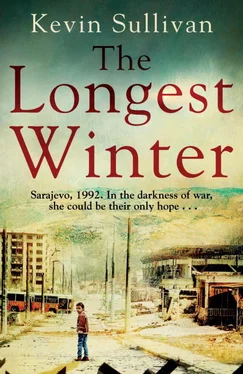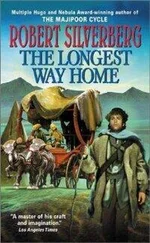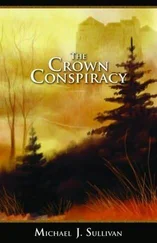Now, years later, on the bus to Sarajevo, she looked out at the trees by the side of the road and the ragged walls of white left by a snowplough. She lit a cigarette. The taste was of metal and smoke.
Milena was more excited than she’d ever been. She was excited about going to the Olympics; she was excited about going to Sarajevo with Mira and Jasmina. Yet she was excited because of something else too. On that early morning travelling from Foča she knew that fate waited at journey’s end.
The bus stopped in villages along the way where groups of people in brightly coloured anoraks and woollen hats and scarves climbed aboard. The sound of the wheels was subsumed in a hum of expectant conversation. They moved through deep valleys dissected by black tunnels, and edged along the side of narrow, fast-flowing rivers and crept to the tops of hills from where they could see, spread in the pale clear light of winter, stark snowbound meadows stretching towards Sarajevo. Trees traced black patterns on the snow; smoke coiled from houses sketching grey wisps of cloud in white air; the countryside was crisscrossed with hedgerows and tracks.
Milena saw this geometric prettiness as God’s overture to their adventure.
For a short time Milena and Mira and Jasmina would belong to Sarajevo. They would be at home there. It would be their time. In these days it would be their city. She peered ahead to catch her first sight of rooftops.
In the cold candlelit bedroom above the theatre Sanela pulled on her jeans, a sweater and thick socks. She dressed with characteristic concentration, not forgetting to tie her silk scarf and tuck it inside the crewneck of her sweater. Anna had arrived with word of the minister’s death on the Airport Road. She wanted Sanela to go back with her to the Holiday Inn and translate the radio bulletins.
Sanela greeted news of the assassination solemnly, almost imperturbably. Zlatko, by contrast, was consumed by nervous energy. As soon as he was dressed, he had hurried off. He didn’t say where he was going.
Before Zlatko left, he had asked Sanela to take a message to Dr Barnes, so when she got to the hotel she knocked at room 305. The sound of her knuckles on the door was swallowed up by the vast cold atrium. She knocked again more loudly and stamped her feet to restore the circulation. There was silence inside. She knocked a third time and then tried the handle, but the door was locked. Then she heard the sound of movement inside. Terry opened the door and smiled.
‘Put the safety chain on the door when you open it,’ Sanela said. ‘There are thieves in the hotel. May I come in?’
Terry moved back into the room and Sanela followed. The air was smoky. Sanela had noticed earlier the way Terry smoked. She held her cigarette away from her body, like a schoolgirl trying out her first puff.
She should have been nice to the doctor, she knew, but she wasn’t in the mood.
‘I had to come back and work,’ she said. ‘I have a message from a friend of Dr Jurić. They have arranged transport for you to go to Otes tomorrow morning. You will leave at nine o’clock. The car will be here then. The driver’s name is Zlatko and he will meet you in the hotel dining room.’
‘Sit down,’ Terry said politely. She wanted to talk to someone. ‘Would you like something to drink?’
‘I can’t. There’s been an incident. A member of the government has been killed. Brad is writing a story now. I have to go.’
Terry looked disappointed, and Sanela guessed it was because she wanted company rather than because a man had been killed. ‘After you’ve visited Otes you will have to go to the PTT, the UN headquarters,’ she added. Terry gave her her full attention. ‘You need to make sure they will take the boy on a plane.’
‘I have a letter from Geneva giving permission.’
There was something inexcusably naive about this woman, Sanela decided. She was out of her depth here if she believed letters would get a civilian and a sick child on a plane.
‘I don’t know anything about that,’ she said.
After Sanela left, Terry sat on the bed. The room was illuminated by two candles which she had placed on the bedside cabinet. She watched the flames flicker in small pools of wax. The candles lit up a fraction of the room. The rest was darkness. She listened to the faint sound of gunfire outside, a sound like pebbles being thrown against a piece of steel. Rat-tat-tat. Not like the sound she had heard when she came back to the hotel from the hospital, the murderous sound of the elastic band. She now had a livid bruise that stretched from her thigh to her hip to remind her of that sound and the panic it had brought with it.
Lying back she listened to the fighting, and then she blew out the candles, smelled the caustic smell of singed tallow, which reminded her of church, and went to sleep.
She woke hours afterwards. It was cold. She slid under the covers still in her clothes and went back to sleep. She remembered the insect scuttling away from her when she was nearly killed. She dreamed about the airport where no one met her, and about the officer with blue epaulettes who said, We’ll put you on a plane . He had hundreds of photocopies. Some documents could get you out. She remembered the white APC making space to let them pass when they held up their laminated cards.
* * *
Terry wasn’t physically scared. Sanela had been impressed when they went to the hospital. She had seen people arrive full of bravado and then when the time came to go out of the hotel they were desperate not to show how frightened they were. Dr Barnes, on the other hand, looked as though she could keep her cool. Her fear was deeper than physical fear.
Sanela was wary because of this nearly existential fear. It was the kind of fear that could endanger the people around Dr Barnes, she thought, the people who were trying to help the doctor and the people she was trying to help.
Brad’s room was just along the corridor. He looked up from the computer when Sanela came in. His expression was grim. The room was smoky.
She lit a cigarette and said, ‘I’ll get the news.’
It was two minutes before the hour. She switched on the radio and waited for the slow sad music that preceded the evening bulletin. It was music that made her think of Zlatko. He used to hum the melody when they sat and listened to the news. Brad tapped on the keyboard, transcribing her translation – minister shot on the Airport Road.
He had not been first with the story.
When he returned from his second visit to the presidency, arriving at the hotel minutes after the competition, there was a newsdesk message waiting. They were holding his piece.
The words were so unexpected that he had to read them twice, and it took some time before he accepted their awful significance. They were holding his story because he hadn’t said who had shot the minister. He had simply reported that the minister had been shot. They wanted clarification.
‘The fucking Rebels shot him!’ he screamed at the computer.
He sent the clarification, but it was too late by then – he had not been first with the story.
When Sanela had translated the radio news bulletin he sent another story, adding background.
Zlatko would learn more than Brad or Sanela. Sanela worked as an interpreter and translator: Zlatko did more – he was an all-round fixer. Zlatko could interpret and translate, but he could also secure petrol on the black market, arrange interviews with ministers and come up with bits of news that were completely unknown to everyone else. He had gone off to talk to half a dozen people in and out of government – and they would all have something to tell him. When he was in the city at night, Sanela feared for him.
Читать дальше












